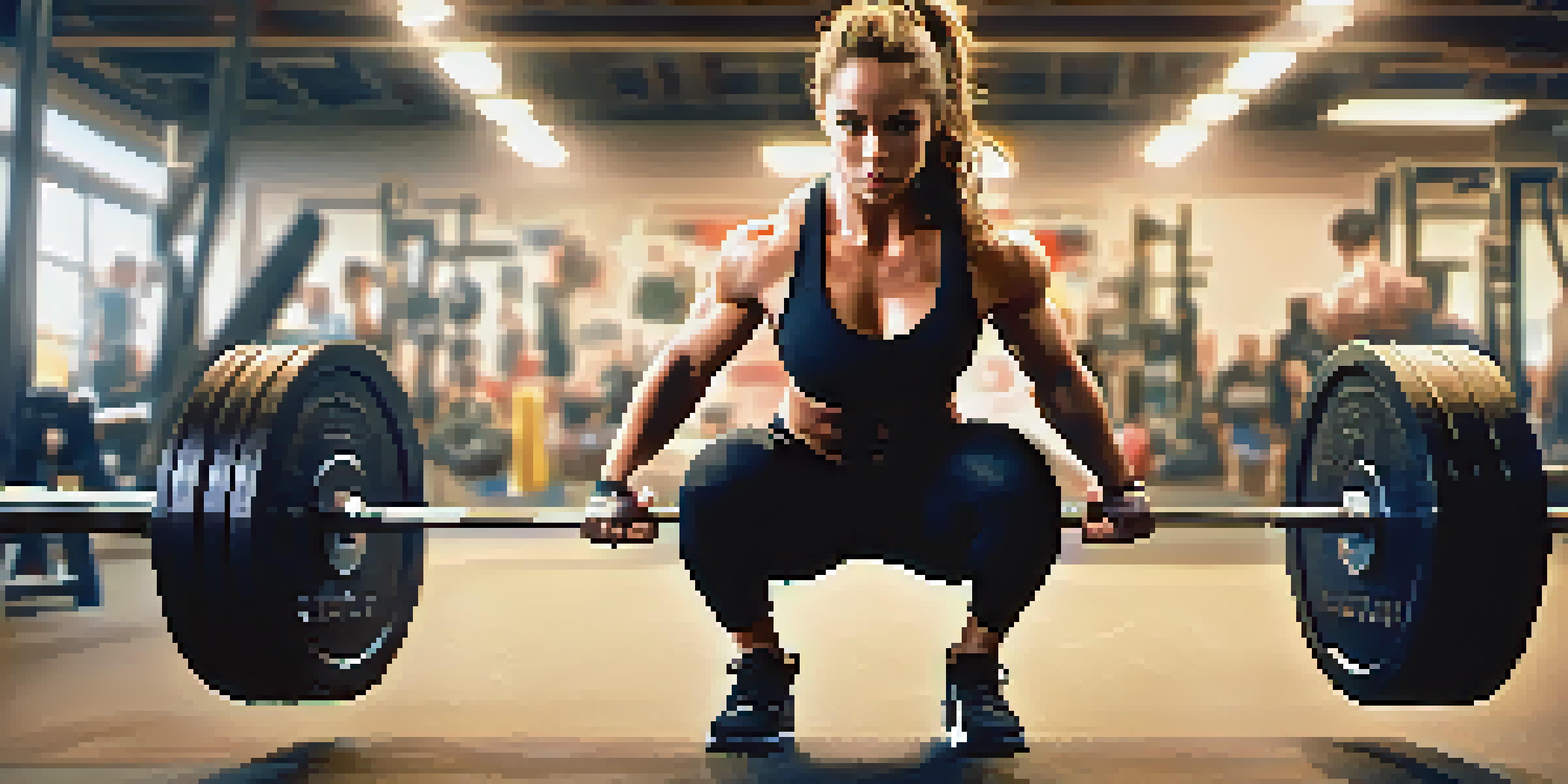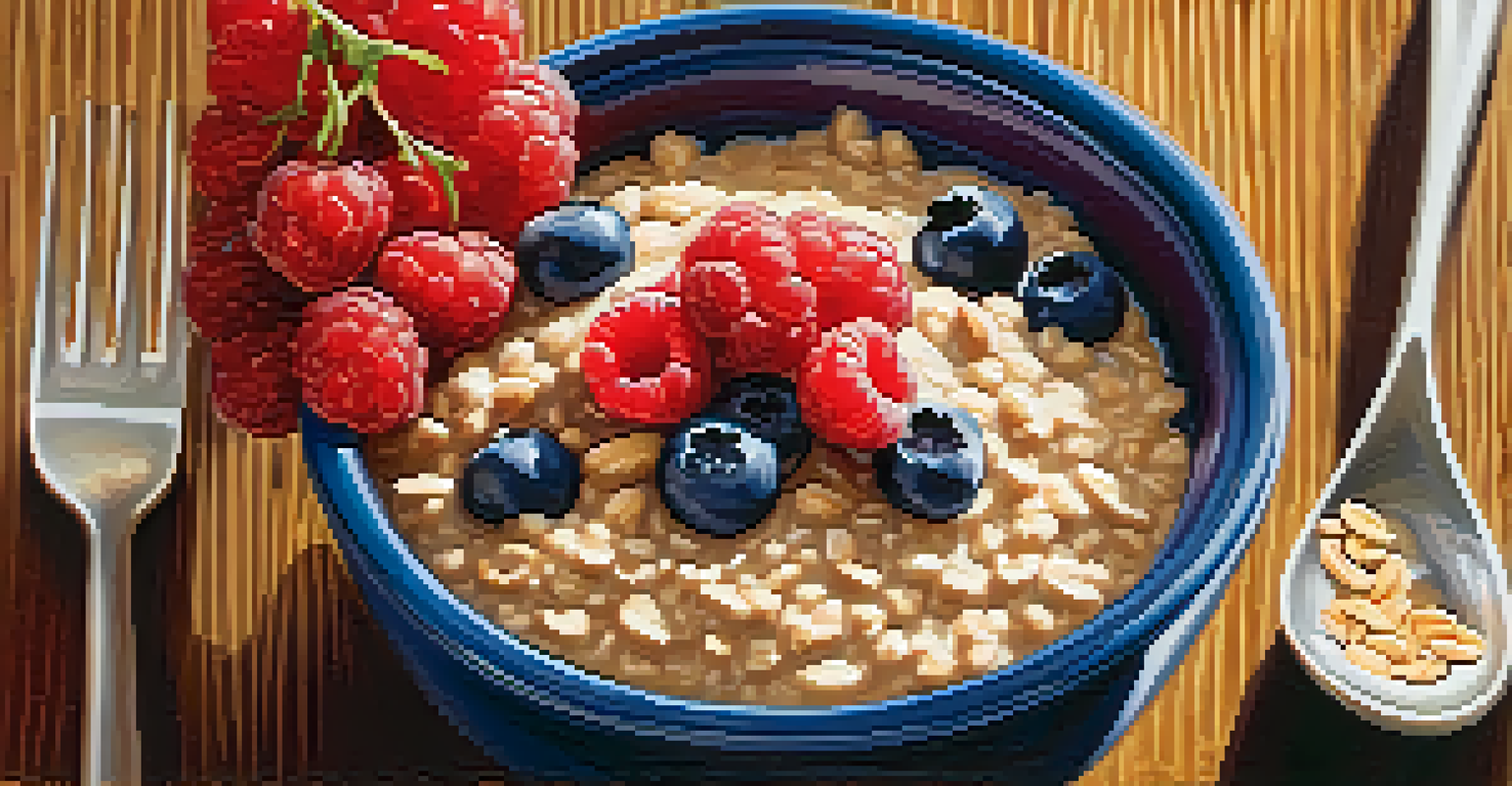Navigating Powerlifting Nutrition: Women's Unique Needs

Understanding Powerlifting and Its Demands
Powerlifting is a strength sport focused on three main lifts: the squat, bench press, and deadlift. Each of these lifts requires not only physical strength but also a strategic approach to nutrition. Women in powerlifting often face unique challenges, including balancing strength gains with overall health and well-being.
Strength does not come from physical capacity. It comes from an indomitable will.
The demands of powerlifting can vary significantly based on training cycles, competition schedules, and individual goals. For women, these factors may also intersect with hormonal fluctuations, making it essential to adapt nutrition plans accordingly. Understanding these dynamics can help create a solid foundation for performance and recovery.
To succeed in powerlifting, women need to prioritize their energy intake, focusing on nutrient-dense foods that support their training. This means not just eating more, but eating wisely to fuel workouts, recover effectively, and support muscle growth.
The Importance of Macronutrients for Women Lifters
Macronutrients—proteins, carbohydrates, and fats—play a crucial role in a powerlifter's diet. Each macronutrient serves a specific purpose, and getting the right balance is vital for optimal performance. For women, understanding how these nutrients interact can empower them to make informed dietary choices.

Protein is particularly important for muscle repair and growth, especially after intense workouts. Women should aim for approximately 1.2 to 2.0 grams of protein per kilogram of body weight, depending on their training intensity. Incorporating lean meats, dairy, legumes, and plant-based proteins can help meet these needs.
Nutrition Fuels Powerlifting Success
Women powerlifters must prioritize nutrient-dense foods to support training, recovery, and muscle growth.
Carbohydrates are essential for providing energy during workouts. Women may need to tailor their carbohydrate intake based on their training schedule, ensuring they consume enough to fuel their lifts while maintaining a healthy body composition. Healthy fats, too, are important for hormone production and overall health, making a balanced approach key.
Timing Your Nutrition Around Workouts
Nutrient timing can significantly impact performance and recovery, especially for women in powerlifting. Consuming the right foods before and after workouts can enhance energy levels and support muscle repair. This strategic approach to eating can help women maximize their training outcomes.
Nutrition is an essential part of your training and overall performance.
Before workouts, a meal or snack rich in carbohydrates and moderate in protein can provide the energy needed for heavy lifting. For example, a banana with a scoop of peanut butter or a small bowl of oatmeal with berries can fuel a training session effectively. Timing this meal about 30-60 minutes prior to training can optimize performance.
Post-workout nutrition is equally important. Consuming protein and carbohydrates within 30 minutes of finishing a workout helps replenish glycogen stores and promotes muscle recovery. A protein shake with a banana or a chicken wrap can be great options to refuel and support muscle growth.
Hydration: A Key Component of Performance
Hydration is often overlooked but is a critical aspect of nutrition for powerlifters. Women need to pay attention to their fluid intake, especially during intense training periods. Dehydration can lead to fatigue, decreased performance, and even injury, making it vital to drink enough water throughout the day.
A good rule of thumb is to aim for at least half your body weight in ounces of water daily. During workouts, especially those lasting longer than an hour, consider incorporating electrolyte-rich drinks to replenish lost minerals. This is particularly important for women, who may experience changes in hydration needs based on their menstrual cycles.
Macronutrients Matter for Lifters
Balancing proteins, carbohydrates, and fats is crucial for optimizing performance and overall health in powerlifting.
Incorporating hydrating foods, like fruits and vegetables, can also help meet daily fluid requirements. Watermelon, cucumbers, and oranges are not only refreshing but also contribute to overall hydration, making them excellent choices for snacks throughout the day.
Addressing Hormonal Considerations in Nutrition
Women's hormonal cycles can influence their training and nutritional needs. Understanding how these fluctuations affect energy levels, mood, and performance is crucial for optimizing nutrition strategies. Tailoring nutrition to align with different phases of the menstrual cycle can enhance training outcomes.
For example, during the follicular phase, women may experience higher energy levels, making it an ideal time to focus on strength training and higher carbohydrate intake. Conversely, during the luteal phase, women might feel more fatigued, which can necessitate adjustments in both training intensity and nutrition.
Incorporating foods rich in magnesium, iron, and omega-3 fatty acids can also support hormonal balance and reduce symptoms associated with menstrual cycles. Leafy greens, fatty fish, nuts, and seeds can be excellent dietary choices to consider during this time.
Building a Sustainable Meal Plan for Lifters
Creating a meal plan that caters to the unique needs of women in powerlifting involves personalization and flexibility. It's essential to develop a plan that not only meets nutritional requirements but also fits individual preferences and lifestyles. This approach fosters long-term adherence and overall satisfaction.
Start by assessing your daily caloric needs based on training intensity, goals, and body composition. Then, focus on incorporating a variety of whole foods, including lean proteins, whole grains, healthy fats, and plenty of fruits and vegetables. This diversity ensures that you get a wide range of nutrients to support your performance.
Intuition Enhances Nutrition Choices
Listening to your body's signals can lead to better food choices that support performance and foster a positive relationship with nutrition.
Lastly, don’t forget to allow for occasional treats and meals that bring joy. Balance is key, and enjoying food should never feel like a chore. A sustainable meal plan is one that you look forward to, making it easier to stick with over time.
Listening to Your Body: The Importance of Intuition
One of the most powerful tools women can have in navigating powerlifting nutrition is intuition. Listening to your body’s signals can provide invaluable insights into what it needs for optimal performance and recovery. This approach fosters a healthier relationship with food and training.
Paying attention to hunger cues, energy levels, and digestive comfort can help guide your nutritional choices. For instance, if you find yourself feeling sluggish during workouts, it might be a sign to adjust your carbohydrate intake or timing. Similarly, if certain foods leave you feeling bloated, it may be worth exploring alternatives.

Intuitive eating doesn’t mean disregarding nutrition principles; rather, it complements them. By combining knowledge with self-awareness, women can create a nutrition strategy that is both effective and enjoyable, ultimately leading to greater success in powerlifting.